Go to Germany to work and stay forever
Hello! My name is Oleg and today I want to share my experience of moving to Germany.
I still communicate with many IT specialists from Russia, and very often, my suggestions to try myself and work in a European company with a move, people answer: "My English is not so good" or "How will I live without relatives nearby?" or "I need a lot of money to move." These are all very important and really difficult moments. But, as I want to try to show on my own experience, quite surmountable.
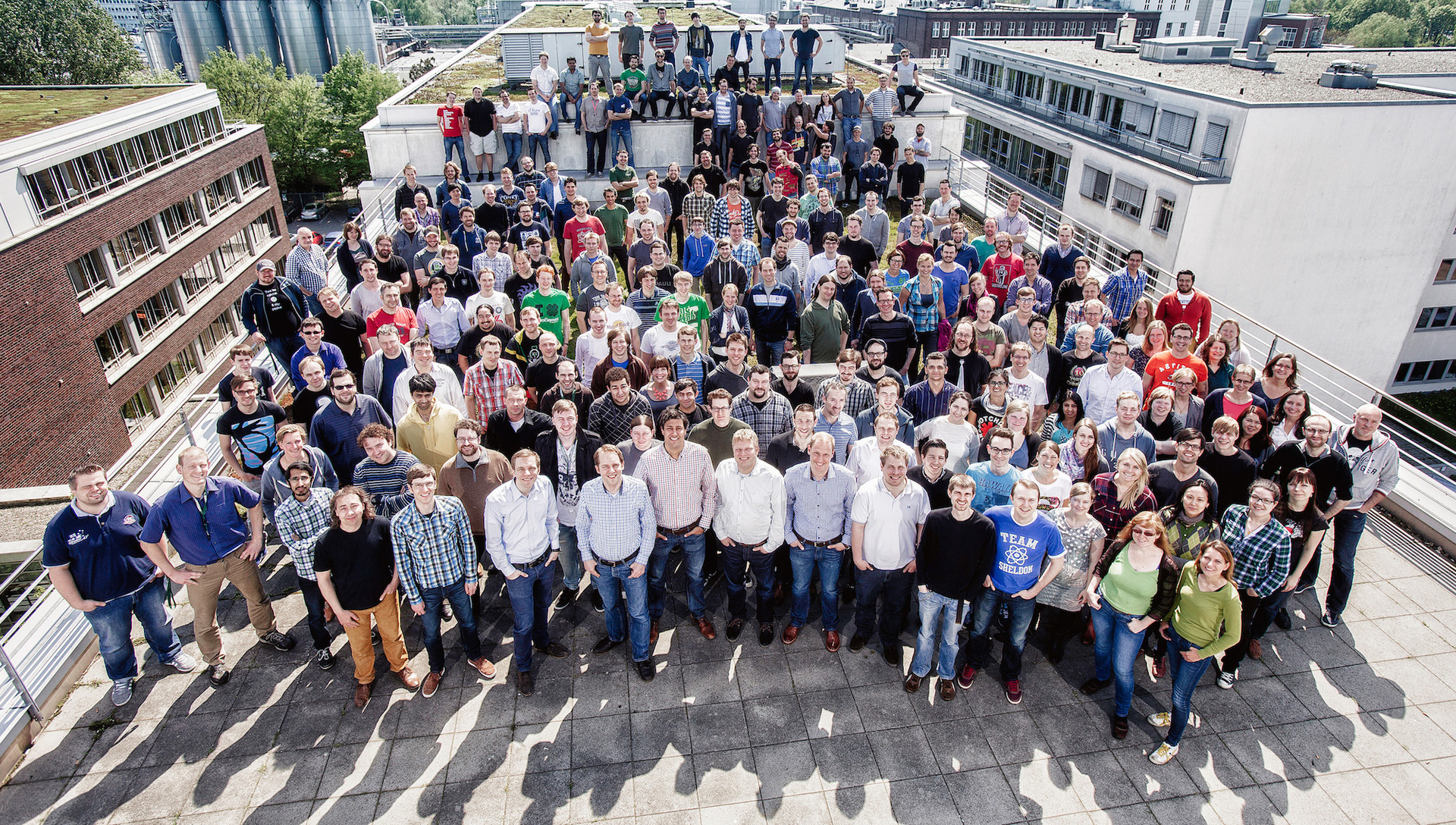
First, a little about yourself:
So, as you can see, I did not have any special achievements. In addition, I spoke English at the level of a 5th grade student (actually practically zero level), and in German I did not know a couple of words. But first things first.
Friends shared their experience that after some universities, studying for system engineers, they only knew the ping team .
The first time I saw Linux was at the University. In general, training at the Polytechnic at a very high level. And the people there are learning appropriate. Many of my classmates at school collected kernels and ran them on microcontrollers, while I first tried Ubuntu on my workstation in my first year at university. In general, it was communication with classmates that gave me the most experience that I still use.
Many people say that a university is not needed, it is a waste of time. I am sure that this is absolutely not the case. It is important not only to get a general education, but to “cook” in these circles and communicate with smart people. Looking ahead, I want to say that many people have been studying at universities in Germany for decades. Just to be closer to the community, even despite the fact that they get lower salaries, because they can’t work full time.
I sent an application via Linkedin (a banned social network in the Russian Federation) and a few days later an interview was scheduled.
As I wrote earlier, my level of English was extremely small. Of course, the basic technical terms can be used directly (mysql, database, OS, loadbalancer ...), but for questions like “Tell me about yourself” I was able to tell at a very primitive level. My wife sat "on the other side of the laptop" and sometimes helped me with answers quickly writing a keyword on a piece of paper. For example, when they asked me: “What character traits do you think are the most powerful in yourself,” she quickly wrote “Humor” and something else, and I got out of the situation without a hitch.
On the technical side, the questions were pretty common for the system administrator. Questions about nginx, databases, basic things about networks and so on. If you have experience working in an IT company before, then passing it will not be difficult.
Hamburg is the city where my company is located. It so happened that I went through all the interviews on skype and the company completely took care of all the documents (of course, I had to send some by e-mail). So in Germany I have never been.
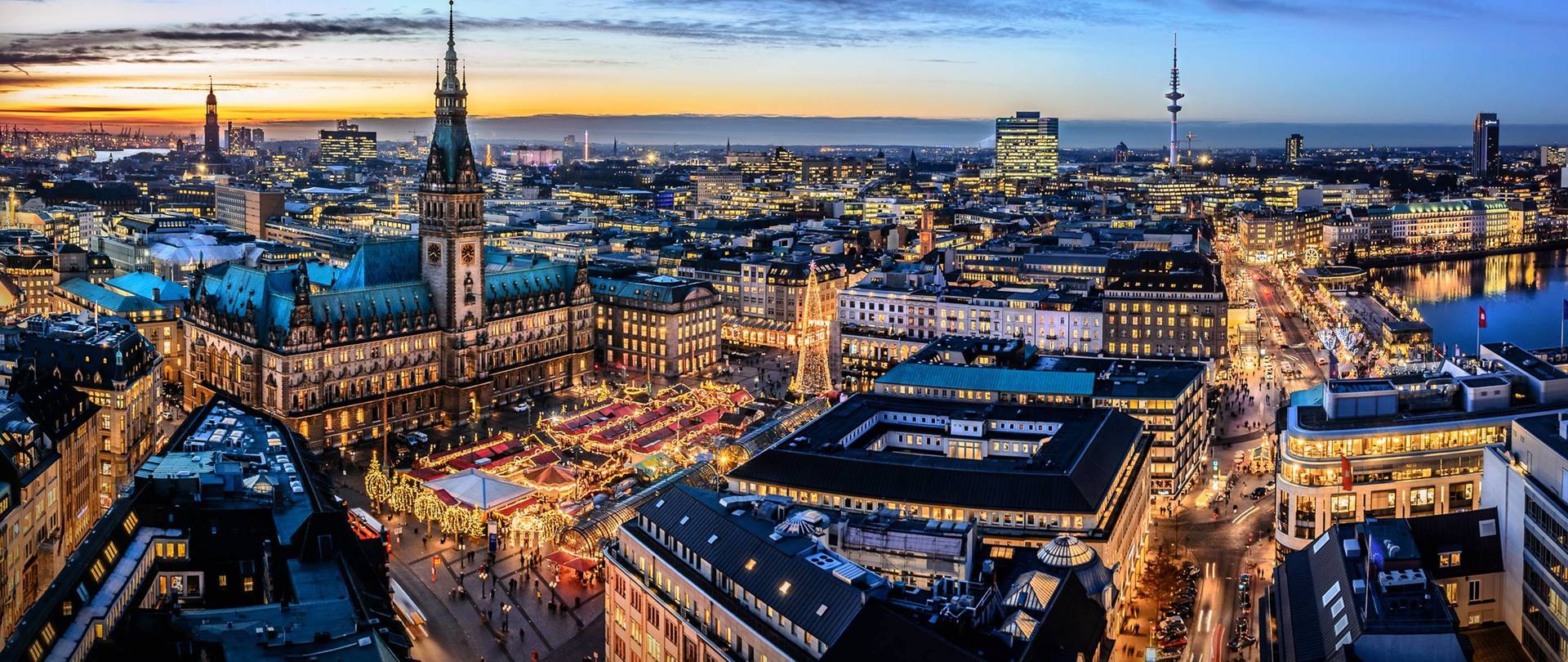
The transfer is included in the Relocation package, so I took my bike as luggage, a backpack full of things, 200 euros and at the appointed time arrived at the airport.
Since I flew to Hamburg only with a bicycle, I had to get to a temporary apartment on it.
Bicycle paths are another story. I have been living here for almost 3 years and have been in many countries of the world, but I have not seen such a developed infrastructure anywhere (Amsterdamians forgive me). There is practically no street without a dedicated bike path, and where this is impossible - it is combined with the roadway and special signs give priority to cyclists:
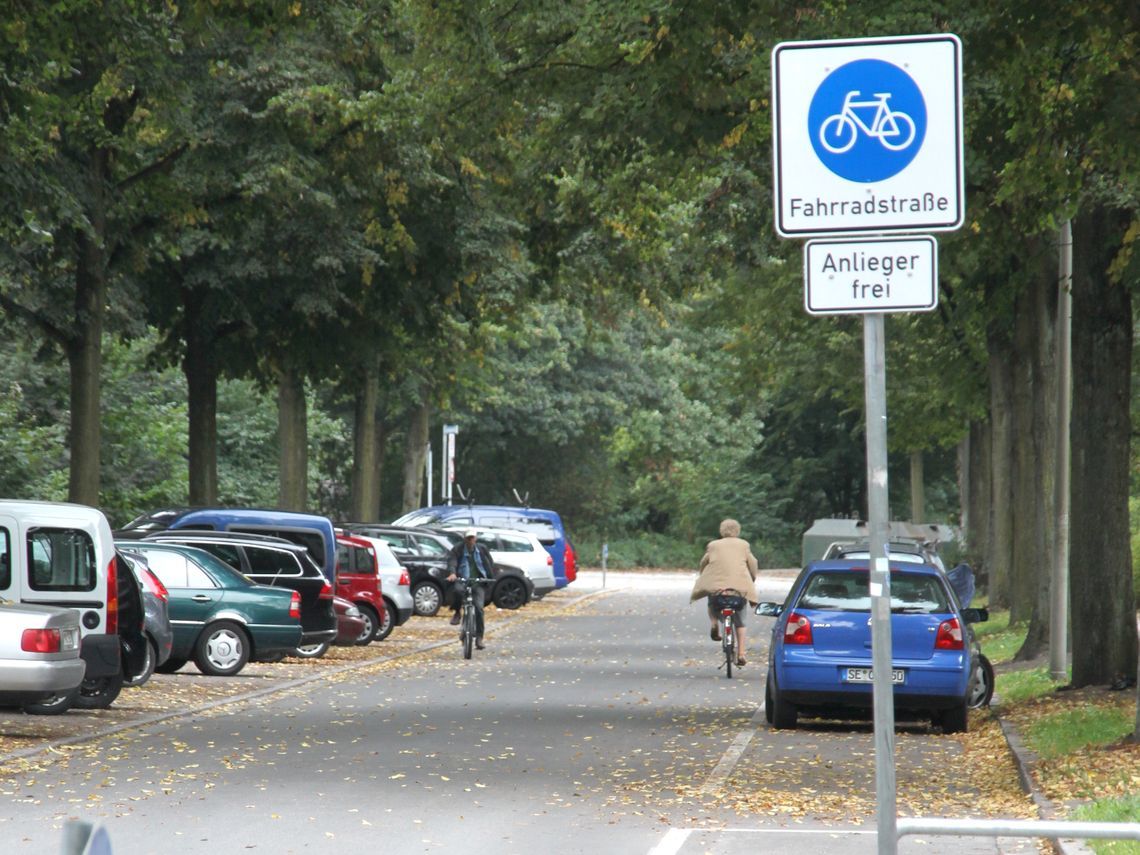
Photo taken from here.
When I lived in St. Petersburg, it was almost impossible to get to the office in the city center by bicycle from the outskirts and even dangerous.
Transport here is at a very good level. There is a certain hierarchy of carriers, for example, Hochbahn runs buses and subways, Deutsche Bahn regulates the network of commuter trains and long-distance trains, Hadag - ferry service. But all together they are united under the general supervision of the HVV (Hamburger Verkehrsverbund). So a ticket for a trip bought in a bus or machine will be valid for any type of transport in the city and the region. There is also a ticket for the whole month, which costs about 80 euros, half of which is paid by the company.
In addition, animals are allowed to enter the transport, which is good news.
Since the Germans are very worried about the environment, it is not uncommon to meet such a hybrid bus on the road:
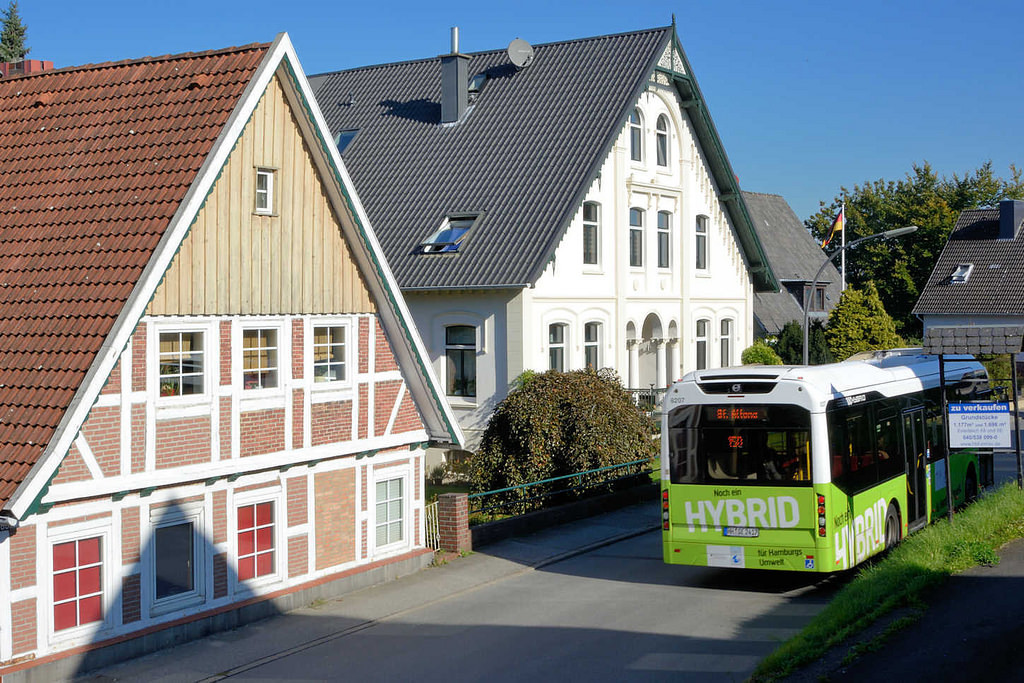
Photo taken from:www.flickr.com/photos/christoph_bellin/21312513444
I can’t speak for all of Germany, but in the northern part, where the glorious city of Hamburg is located, there is a very tolerant attitude towards foreigners.
One colleague told me on the first day: "Well done, that he moved to northern Germany." Then I did not understand why.
From myself I can say that I never felt like a stranger here. For all 3 years of life here no one even looked askance at us, and all issues are perfectly resolved in English or even in Russian.
The bulk of the houses here are not higher than 5 floors, so living on the top floor it is easy to have such a view from the balcony:

By Russian standards, renting an apartment here is very expensive. For example, for 76 km. m we pay 800 euros per month plus 100 for utilities. And it is about 30 minutes by bike from the center (7 km). But the quality of housing is definitely worth it. For example, if there is a problem with the plumbing or the roof is leaking, the owner of the house will be required to fix the problem at his own expense as soon as possible. Once our dishwasher broke down and the homeowner replaced it absolutely free with a new one for a month.
I moved with my wife and cat, who, like me, did not speak German.
Since I am a Blue Card holder (special permission for qualified professionals), my wife automatically received a work permit. Then we did not even understand how lucky we were. In many countries, such permission is not given at all or given, but on a part-time basis.
After 8 months, my wife’s spoken German level was sufficient to get an interview and get a job. Although the company in which it operates can hardly be called international, no one pays attention to speech errors or emphasis.
Many say that the Germans are a hardworking people. It really is. For example, there are no 2-week New Year holidays like in Russia. The bulk of the working population at work is already at 8 in the morning. However, no one lingers after work. I would even say that this is not welcome. Several times already, my boss asked me not to linger, because in the case of my promotion, my colleagues may say that the reason was overtime work.
Vacation in Germany is 28 working days, which the employee can use as he wants, when, as in Russia, 28 calendar days and one of the parts of this vacation should be at least 2 weeks.
As in many international companies, the official language here is English. The company provides free German courses right at the office. So the level of your English and German, and with it your horizons, will grow every day.
As I mentioned above, the company took on most of the problems with the relocation. I had to apply for a visa myself, but if I had a contract, I received it after 3 days. The visa is granted category D and allows work for 3 months. During this time, an agent hired by the company will hold hands at all levels and will help in obtaining the same Blue Card and permission to work and stay for the spouse.
With the search for an apartment, a special agent also helps, who carries in his car to the apartments selected in advance and all that remains is to say “Yes”. Of course, you don’t have to pay.
The first thing you notice is a truly international company. At the moment we have about 35 different nationalities. There are never enough topics for conversation: cultural features in Pakistan, the political situation in Australia are the most common topics for conversation.
The company is trying to maintain the feeling of a startup. Any thing that can indirectly help in the work, costing up to 100 euros, is bought without further questions. For example, wireless headphones or a gym ball.
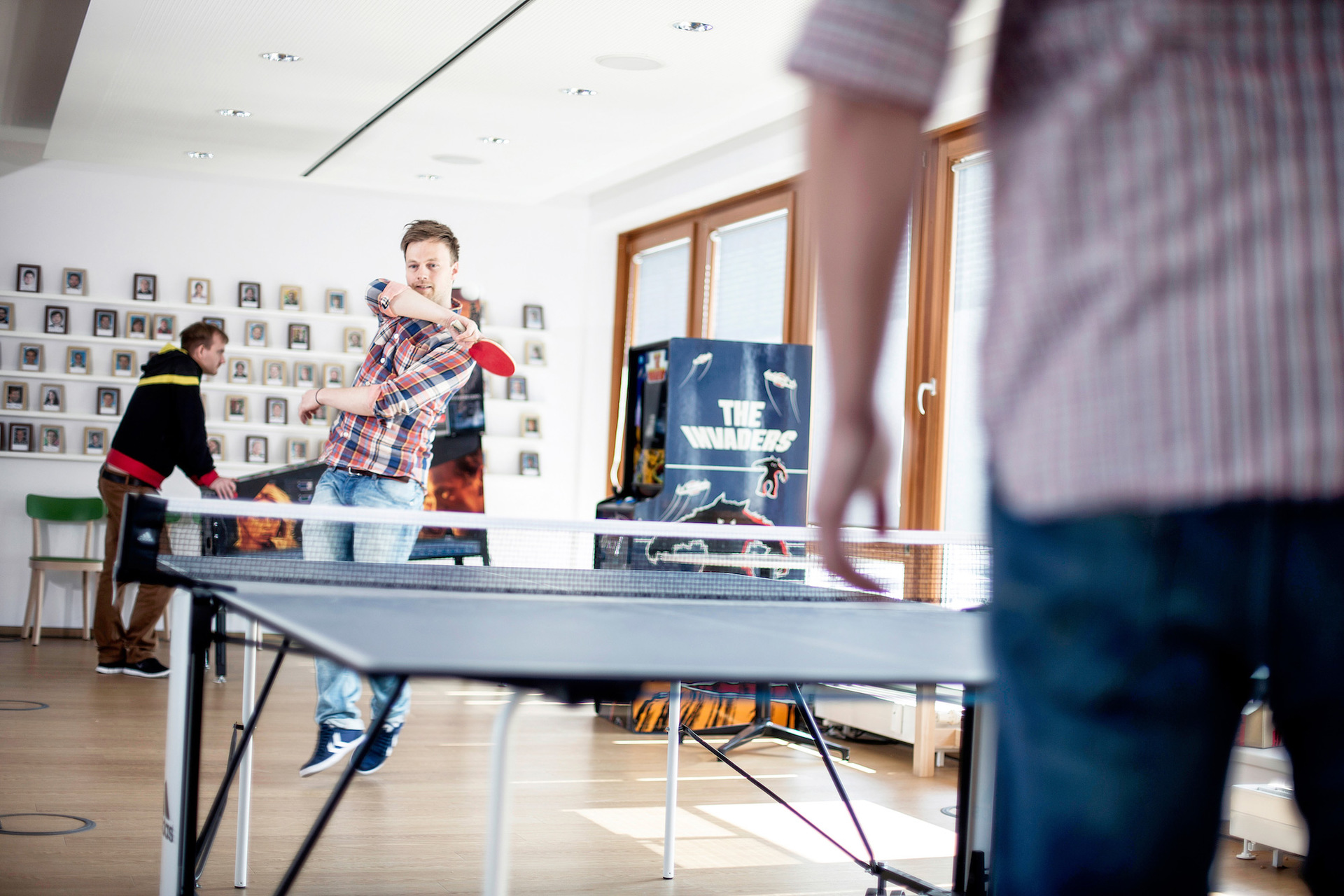
In addition to the most common bonuses in IT, such as: cold drinks, beer, fruits, table tennis, a gym, there are very significant - educational ones.
For example, you can easily represent a company at any conference in any part of the world. So, for example, I did last year:
After the move, the first time was difficult. There is always a risk of not passing a trial period and being left without money in another country. But everything worked out and I would like to talk about the prospects that await the one who decides to move:
I still communicate with many IT specialists from Russia, and very often, my suggestions to try myself and work in a European company with a move, people answer: "My English is not so good" or "How will I live without relatives nearby?" or "I need a lot of money to move." These are all very important and really difficult moments. But, as I want to try to show on my own experience, quite surmountable.

First, a little about yourself:
- Born and raised in St. Petersburg
- He studied at the most ordinary district school - there were no special biases. This greatly affected my future studies at the University.
- He entered the St. Petersburg State Polytechnic University at the Faculty of Technical Cybernetics (FTK)
- For some time he worked at his own school, servicing printers and reinstalling Windows
- Passed an interview in Yandex for a junior system administrator
- Received an offer from InnoGames and moved to Germany, where I now live and work.
So, as you can see, I did not have any special achievements. In addition, I spoke English at the level of a 5th grade student (actually practically zero level), and in German I did not know a couple of words. But first things first.
University
Friends shared their experience that after some universities, studying for system engineers, they only knew the ping team .
The first time I saw Linux was at the University. In general, training at the Polytechnic at a very high level. And the people there are learning appropriate. Many of my classmates at school collected kernels and ran them on microcontrollers, while I first tried Ubuntu on my workstation in my first year at university. In general, it was communication with classmates that gave me the most experience that I still use.
Many people say that a university is not needed, it is a waste of time. I am sure that this is absolutely not the case. It is important not only to get a general education, but to “cook” in these circles and communicate with smart people. Looking ahead, I want to say that many people have been studying at universities in Germany for decades. Just to be closer to the community, even despite the fact that they get lower salaries, because they can’t work full time.
Interview at InnoGames
I sent an application via Linkedin (a banned social network in the Russian Federation) and a few days later an interview was scheduled.
As I wrote earlier, my level of English was extremely small. Of course, the basic technical terms can be used directly (mysql, database, OS, loadbalancer ...), but for questions like “Tell me about yourself” I was able to tell at a very primitive level. My wife sat "on the other side of the laptop" and sometimes helped me with answers quickly writing a keyword on a piece of paper. For example, when they asked me: “What character traits do you think are the most powerful in yourself,” she quickly wrote “Humor” and something else, and I got out of the situation without a hitch.
On the technical side, the questions were pretty common for the system administrator. Questions about nginx, databases, basic things about networks and so on. If you have experience working in an IT company before, then passing it will not be difficult.
Germany
Hamburg is the city where my company is located. It so happened that I went through all the interviews on skype and the company completely took care of all the documents (of course, I had to send some by e-mail). So in Germany I have never been.

The transfer is included in the Relocation package, so I took my bike as luggage, a backpack full of things, 200 euros and at the appointed time arrived at the airport.
Cycling culture
Since I flew to Hamburg only with a bicycle, I had to get to a temporary apartment on it.
Bicycle paths are another story. I have been living here for almost 3 years and have been in many countries of the world, but I have not seen such a developed infrastructure anywhere (Amsterdamians forgive me). There is practically no street without a dedicated bike path, and where this is impossible - it is combined with the roadway and special signs give priority to cyclists:

Photo taken from here.
When I lived in St. Petersburg, it was almost impossible to get to the office in the city center by bicycle from the outskirts and even dangerous.
Transport
Transport here is at a very good level. There is a certain hierarchy of carriers, for example, Hochbahn runs buses and subways, Deutsche Bahn regulates the network of commuter trains and long-distance trains, Hadag - ferry service. But all together they are united under the general supervision of the HVV (Hamburger Verkehrsverbund). So a ticket for a trip bought in a bus or machine will be valid for any type of transport in the city and the region. There is also a ticket for the whole month, which costs about 80 euros, half of which is paid by the company.
In addition, animals are allowed to enter the transport, which is good news.
Since the Germans are very worried about the environment, it is not uncommon to meet such a hybrid bus on the road:

Photo taken from:www.flickr.com/photos/christoph_bellin/21312513444
Attitude towards foreigners
I can’t speak for all of Germany, but in the northern part, where the glorious city of Hamburg is located, there is a very tolerant attitude towards foreigners.
One colleague told me on the first day: "Well done, that he moved to northern Germany." Then I did not understand why.
From myself I can say that I never felt like a stranger here. For all 3 years of life here no one even looked askance at us, and all issues are perfectly resolved in English or even in Russian.
Housing
The bulk of the houses here are not higher than 5 floors, so living on the top floor it is easy to have such a view from the balcony:

By Russian standards, renting an apartment here is very expensive. For example, for 76 km. m we pay 800 euros per month plus 100 for utilities. And it is about 30 minutes by bike from the center (7 km). But the quality of housing is definitely worth it. For example, if there is a problem with the plumbing or the roof is leaking, the owner of the house will be required to fix the problem at his own expense as soon as possible. Once our dishwasher broke down and the homeowner replaced it absolutely free with a new one for a month.
Second half
I moved with my wife and cat, who, like me, did not speak German.
Since I am a Blue Card holder (special permission for qualified professionals), my wife automatically received a work permit. Then we did not even understand how lucky we were. In many countries, such permission is not given at all or given, but on a part-time basis.
After 8 months, my wife’s spoken German level was sufficient to get an interview and get a job. Although the company in which it operates can hardly be called international, no one pays attention to speech errors or emphasis.
Work culture
Many say that the Germans are a hardworking people. It really is. For example, there are no 2-week New Year holidays like in Russia. The bulk of the working population at work is already at 8 in the morning. However, no one lingers after work. I would even say that this is not welcome. Several times already, my boss asked me not to linger, because in the case of my promotion, my colleagues may say that the reason was overtime work.
Vacation in Germany is 28 working days, which the employee can use as he wants, when, as in Russia, 28 calendar days and one of the parts of this vacation should be at least 2 weeks.
Innogames
As in many international companies, the official language here is English. The company provides free German courses right at the office. So the level of your English and German, and with it your horizons, will grow every day.
Relocation
As I mentioned above, the company took on most of the problems with the relocation. I had to apply for a visa myself, but if I had a contract, I received it after 3 days. The visa is granted category D and allows work for 3 months. During this time, an agent hired by the company will hold hands at all levels and will help in obtaining the same Blue Card and permission to work and stay for the spouse.
With the search for an apartment, a special agent also helps, who carries in his car to the apartments selected in advance and all that remains is to say “Yes”. Of course, you don’t have to pay.
Culture
The first thing you notice is a truly international company. At the moment we have about 35 different nationalities. There are never enough topics for conversation: cultural features in Pakistan, the political situation in Australia are the most common topics for conversation.
The company is trying to maintain the feeling of a startup. Any thing that can indirectly help in the work, costing up to 100 euros, is bought without further questions. For example, wireless headphones or a gym ball.
Bonuses

In addition to the most common bonuses in IT, such as: cold drinks, beer, fruits, table tennis, a gym, there are very significant - educational ones.
For example, you can easily represent a company at any conference in any part of the world. So, for example, I did last year:
Finally
After the move, the first time was difficult. There is always a risk of not passing a trial period and being left without money in another country. But everything worked out and I would like to talk about the prospects that await the one who decides to move:
- After a year of work, invitations to interviews come from all over the world. The effect of "status works for you." Recruiters understand that since the company transported an employee, having paid a lot of money and he was not fired, then he was worth something.
- A great chance to learn a language and get to know a different culture.
- The opportunity to obtain citizenship of another country after 6 years of stay in it.
